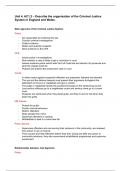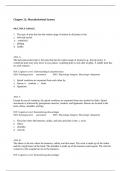Week 1
● Introduction slides
Week 2
● Lecture 1: History and concepts
● Lecture 2: Memory
Lecture 1
● Topic: History and concepts
What is social cognition? ● It is about making sense of our world and constructing a social reality.
- I.e Every day we are faced with many people each with their own
thoughts and behaviors that we have to make sense of.
● Constructing a social reality also means there is no objectively true
( social) reality.
- The same stimulus can be interpreted in different ways.
Aim of social cognition ● Making sense of social reality by looking at
1. Situation: what is going on (context).
2. Person: who is processing the information.
3. Cognitive processes (unique feature): How does thinking and
feeling work.What are the mechanisms that underlie the
construction of social reality? → ( Example: elections: personality
( constant), context (the situation is changing), mechanisms of the
cognitive process (differ) inspire a new reality ).
,Social cognition combines ● Phenomenology
both ● Cognitive psychology
Phenomenology Systematic description of how people say they experience themselves in their
social environments.
→ Lay theories
→ Everyday psychology
→ Mental models
Cognitive psychology Studying how basic human cognition ( memory, attention, perception, etc) are
organized and different ways to use them. Uses more specific models.
→ Models of information processing
→ Models of information retention
In sum, social cognition ● How is information encoded, stored, and retrieved from memory?
studies ● How is social knowledge structured and represented?
● How are social judgements and decisions made ?
● For all: by different people and different situations.
→ For all of these questions, social cognition researchers always allow
for variance coming from the personal side and from the situational
, side.
How is social cognition ● It can be applied to many sectors.
research applied ● Kendall Jenner Pepsi advertisement (BLM rally). Whether the message
was perceived as being offensive depended on the person and also their
background- i.e they constructed different social realities.
→ Here an a priori focus on social cognitive principles might have
helped to avoid the situation.
Why is social cognition ● For a long time, people were not interested in the causes of behavior. Only
needed? A brief history study the behavior itself (behaviorism) especially in stimulus-response.
→ 1 cause - 1 outcome and no care for what happens in between “ the
black box approach”
● Radical behaviorism ( Burrhus Skinner)
● Methodological behaviorism (J. Watson)
● Over the years the methodological problems were overcome - Cognitive
revolution
Radical behaviorism ● Cognitive processes should not be studied. Because we have no evidence
( Burrhus Skinner) that there is a causal direction (that cognitions affect behavior.)
→ Cognitions could be post-hoc rationalizations of behavior. People see a
stimulus, behave in a specific way, and then after the fact they make up a
story (rationalize) their behavior. Not informative.
Methodological ● A slightly less radical view.
behaviorism (J. Watson)
, ● Idea: cognitions in principle could be useful but the issues are:...
→ We cannot observe or measure them ( well).
→ Until we can measure cognition we should focus on stimulus-response
relations.
● How to measure cognition:
→ cognitions cannot be observed (well)
→ Explaining behavior with stimulus-response.
→ Reinforcement learning
Cognitive revolution ● Overcoming the methodological problems: Here meaning rather than
behavior becomes the focus.
→ Improvements in how we conduct experiments
→ Experimental manipulation of the environment ( create situations
that make specific cognitive processes more or less likely)
→ Observe changes in behavior that cannot be explained using a simple
stimulus-response explanation. And from these changes, we can then
infer mental states.
→ The effort to establish meaning-making as a central concept of
psychology. - Bruner 1990 ( this is the beginning of social cognition,
even though it was not named that)
Cognitive revolution ● Cognitive dissonance experiment. Shows how we need cognitions to
- An example of an explain human behavior.
experiment that ● Festinger and carlsmith
demonstrates social
cognition
● Introduction slides
Week 2
● Lecture 1: History and concepts
● Lecture 2: Memory
Lecture 1
● Topic: History and concepts
What is social cognition? ● It is about making sense of our world and constructing a social reality.
- I.e Every day we are faced with many people each with their own
thoughts and behaviors that we have to make sense of.
● Constructing a social reality also means there is no objectively true
( social) reality.
- The same stimulus can be interpreted in different ways.
Aim of social cognition ● Making sense of social reality by looking at
1. Situation: what is going on (context).
2. Person: who is processing the information.
3. Cognitive processes (unique feature): How does thinking and
feeling work.What are the mechanisms that underlie the
construction of social reality? → ( Example: elections: personality
( constant), context (the situation is changing), mechanisms of the
cognitive process (differ) inspire a new reality ).
,Social cognition combines ● Phenomenology
both ● Cognitive psychology
Phenomenology Systematic description of how people say they experience themselves in their
social environments.
→ Lay theories
→ Everyday psychology
→ Mental models
Cognitive psychology Studying how basic human cognition ( memory, attention, perception, etc) are
organized and different ways to use them. Uses more specific models.
→ Models of information processing
→ Models of information retention
In sum, social cognition ● How is information encoded, stored, and retrieved from memory?
studies ● How is social knowledge structured and represented?
● How are social judgements and decisions made ?
● For all: by different people and different situations.
→ For all of these questions, social cognition researchers always allow
for variance coming from the personal side and from the situational
, side.
How is social cognition ● It can be applied to many sectors.
research applied ● Kendall Jenner Pepsi advertisement (BLM rally). Whether the message
was perceived as being offensive depended on the person and also their
background- i.e they constructed different social realities.
→ Here an a priori focus on social cognitive principles might have
helped to avoid the situation.
Why is social cognition ● For a long time, people were not interested in the causes of behavior. Only
needed? A brief history study the behavior itself (behaviorism) especially in stimulus-response.
→ 1 cause - 1 outcome and no care for what happens in between “ the
black box approach”
● Radical behaviorism ( Burrhus Skinner)
● Methodological behaviorism (J. Watson)
● Over the years the methodological problems were overcome - Cognitive
revolution
Radical behaviorism ● Cognitive processes should not be studied. Because we have no evidence
( Burrhus Skinner) that there is a causal direction (that cognitions affect behavior.)
→ Cognitions could be post-hoc rationalizations of behavior. People see a
stimulus, behave in a specific way, and then after the fact they make up a
story (rationalize) their behavior. Not informative.
Methodological ● A slightly less radical view.
behaviorism (J. Watson)
, ● Idea: cognitions in principle could be useful but the issues are:...
→ We cannot observe or measure them ( well).
→ Until we can measure cognition we should focus on stimulus-response
relations.
● How to measure cognition:
→ cognitions cannot be observed (well)
→ Explaining behavior with stimulus-response.
→ Reinforcement learning
Cognitive revolution ● Overcoming the methodological problems: Here meaning rather than
behavior becomes the focus.
→ Improvements in how we conduct experiments
→ Experimental manipulation of the environment ( create situations
that make specific cognitive processes more or less likely)
→ Observe changes in behavior that cannot be explained using a simple
stimulus-response explanation. And from these changes, we can then
infer mental states.
→ The effort to establish meaning-making as a central concept of
psychology. - Bruner 1990 ( this is the beginning of social cognition,
even though it was not named that)
Cognitive revolution ● Cognitive dissonance experiment. Shows how we need cognitions to
- An example of an explain human behavior.
experiment that ● Festinger and carlsmith
demonstrates social
cognition










